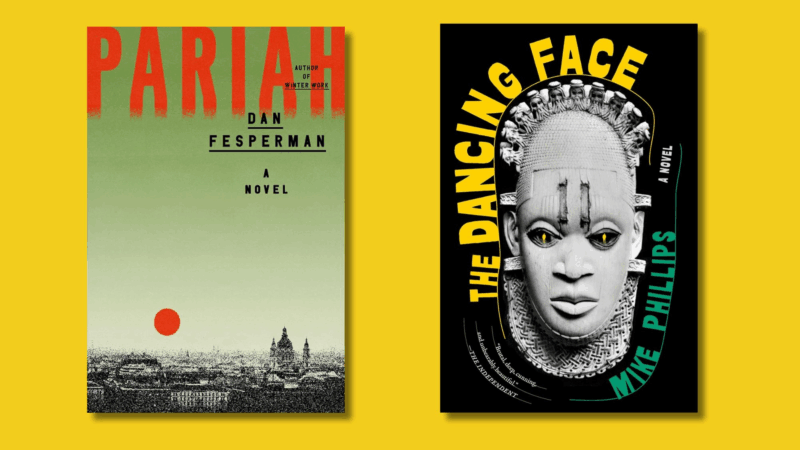Two genre novels offer entertainment — and plenty of wry social commentary
Last month, in a now-viral opinion piece called “When Novels Mattered,” New York Times columnist David Brooks bemoaned what he sees as the increasing irrelevance of literary fiction to American life. Gone are the days when John Updike, Norman Mailer and Toni Morrison dominated bestseller lists; now, fantasy and genre fiction rule.
I’m not going to jump into the bear pit here, except to say that, perhaps, Brooks isn’t reading the right stuff. Here’s my recommendation for two genre novels that manage to be sly, wry and smart works of social commentary even as they entertain. Neither are in league with, say, Portnoy’s Complaint or The Color Purple, but nor are they mental Styrofoam.
I’ve been following Dan Fesperman’s espionage novels since his debut in 1999 with Lie in the Dark. That novel was set during the siege of Sarajevo, which Fesperman, a former foreign correspondent, covered. Pariah, his latest spy story, also draws from recognizable real-life figures and situations.
Hal Knight, the anti-hero of this tale, is a comedian and movie star who parlayed his brand of bro humor into a political career. Knight served for two months as a Democratic Congressman from California but had to resign when a video went viral of him profanely bullying an actor on set. As we’re told:
On a spectrum of bad male behavior that ran from, say, Al Franken at its tamest to Harvey Weinstein at its vilest extreme, Hal’s transgressions fell well toward the lower end, yet still within the vast middle ground where final judgment often depended on who was doing the judging.
The opening of this tale finds Hal sulking in isolation on a Caribbean island, drinking dirty martinis and, appropriately enough, reading Philip Roth. What Hal doesn’t know is that the CIA is watching.
Soon, a trio of agents approach him. They recruit Hal to accept an invitation to perform his comedy routine for the president of the Eastern European country of Bolrovia. It seems that something rotten is underway in Bolrovia. If Hal can keep his eyes and ears open while he’s yukking it up with the despot, he may garner valuable intel.
Pariah embraces a slew of spy novel tropes: the flawed hero who needs redemption, double agents and the bewildering layout of the old capital city of Bolrovia, where one wrong turn can lead Hal to the ultimate dead end. In a delicious climactic moment set in an underground bar called the Green Devil, a group of former Fox News “personalities” even makes an entrance. As always with suspense, the greatest pleasure lies in the plot, which here has the quality of being labyrinthine but lucid.
Mike Phillips, a British author born in Guyana, also has a long track record in crime writing along with a parallel career as an art curator. That expertise comes into play in The Dancing Face, a crime novel that originally came out in Britain in 1997 and is now available for the first time in the United States.
Here’s the premise: a Black university professor named Augustus “Gus” Dixon attends a committee meeting to discuss holding protests against a touring “African art” exhibition, whose objects were the spoils of colonialism. Impatient with the academic grandstanding of his colleagues, Gus snaps:
Demonstrations and vigils were pointless, he told [his colleagues]. The only result … would be a few minutes on the air being patronized by a succession of young white women with microphones.
Accordingly, Gus masterminds a scheme to steal “The Dancing Face,” a gold mask from Benin that’s packed away in a London exhibition space. The plan, naturally, goes haywire, given that Gus’ accomplices don’t share his lofty motives for stealing the mask. Chief among them is the wealthy Nigerian businessman who’s bankrolled the heist and who expects to add the mask to his personal art collection.
The Dancing Face engages issues of reparations and identity while also holding its own with other classic crime novels about missing McGuffins. I’m thinking of novels like The Maltese Falcon and Cotton Comes to Harlem. Like those novels, The Dancing Face offers an antic, absurdist take on the spectacle of flawed human beings attempting to set to rights a world gone wrong.
Mexican army kills leader of Jalisco New Generation Cartel, official says
The Mexican army killed the leader of the powerful Jalisco New Generation Cartel, Nemesio Rubén Oseguera Cervantes, "El Mencho," in an operation Sunday, a federal official said.
Ukraine’s combat amputees cling to hope as a weapon of war
Along with a growing number of war-wounded amputees, Mykhailo Varvarych and Iryna Botvynska are navigating an altered destiny after Varvarych lost both his legs during the Russian invasion.
University students hold new protests in Iran around memorials for those killed
Iran's state news agency said students protested at five universities in the capital, Tehran, and one in the city of Mashhad on Sunday.
Pakistan claims to have killed at least 70 militants in strikes along Afghan border
Pakistan's military killed at least 70 militants in strikes along the border with Afghanistan early Sunday, the deputy interior minister said.
Team USA faces tough Canadian squad in Olympic gold medal hockey game
In the first Olympics with stars of the NHL competing in over a decade, a talent-packed Team USA faces a tough test against Canada.
PHOTOS: Your car has a lot to say about who you are
Photographer Martin Roemer visited 22 countries — from the U.S. to Senegal to India — to show how our identities are connected to our mode of transportation.






